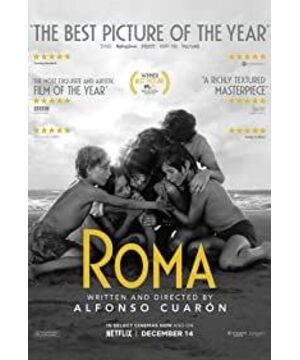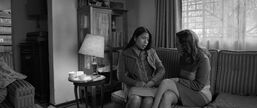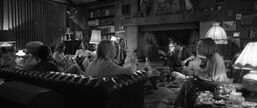I watched Roma at the IFC center with my friends. If it is out of ten, it would be a 7. Out of control, long-winded, dazzling, the warmth of the upper middle-class fun, it is no problem to cut it for half an hour (a big failure at the beach). Plain and simple will be more powerful.
The first half thinks of Renoir's "Rules of the Game", and the second half thinks of Xu Anhua's "Peach Sister". An understatement about politics.
Roma by Alfonso Cuaron. Begins with "earth" and ends with "heaven".
The first set of shots in the opening chapter is carefully designed: close-up of the tile floor, water flowing through, and airplane flying over the reflection. Then tilt up, the heroine Cleo appears, gradually revealing larger spaces: corridors, courtyards, and the host's rooms.
In this scene and throughout the film, the courtyard-based off-screen sounds continue to suggest a larger spatial environment: birdsong, dogs barking, a military band in the street, the sharpener's whistle...
If the painstakingly long shots and camera movements at the beginning are a bit deliberate but still hopeful, the first time the doctor goes home is obviously overdone: headlights, bodywork, wheels, hands, cigarette butts, shit... The shots are repeatedly cut, such as a TV commercial for selling a car, or an action movie where the spectacle of a car chase is on the verge of triggering, but here I just want to imply that the doctor is reluctant to go home and may have an affair.
All these dazzling skills, cumbersomeness and craftsmanship, if there is no support behind the thought, they will fall into the trap of self-indulgence. For example, the result of discussion with friends: the director of this film wants to say too much, but he actually doesn't have much to say... For example, the first draft of the paper that is stuck in the accumulation of materials needs to be separated and repaired drastically. Wong Kar-wai was quite self-aware of this. He was intemperate and could not bear to cut, so he asked Zhang Shuping, who he trusted, to take the scissors.
In "Roma", the director's attitude towards the relationship between master and servant and the relationship between whites and aborigines presents a chaotic contradiction that is slightly criticized but cannot bear to deviate from his own class experience, and finally surrenders to the cheapness that he may not believe. The "love saves all" depoliticized values.
In the Roman community of Mexico City, at first Cleo and his maid companions also laughed at the hostess for complaining about their "cost of electricity", while lighting candles and doing yoga (?). After the hostess was abandoned by her husband, she surpassed the pregnant Cleo who was abandoned by Fermín. The "same sickness" of the class, not to mention that Cleo became a "life-saving savior" on the beach, and finally can become a "family that loves each other". On the responsible power relationship between middle-class families and the nanny class (migrant workers such as Filipino maids or indigenous girls in Latin America), Singaporean director Chen Zheyi's "Parents Are Not Home" (2013) and Argentine director Lucrecia Martell Martel's The Swamp (2001) is much sharper. In the latter, white middle-class families, including children, discriminate against Aboriginal maids and their ethnic groups in countless everyday details.
In "Roma", the relationship between dogs and their owners, and the aborigines, is also quite intriguing. In this courtyard in Rome, the two maids and the dog Borras lived in the marginal space outside the master's house. However, because of their entanglement with the urban masters, they also have some kind of alienation from the life of the aborigines. In the Christmas village, Jose, a powerful white man who took advantage of the land of the aborigines, could even kill the son of the aborigines who dared not speak out-they could only silently poison the owner's dog, or put one in the forest. Put on fire (my guess).
"Roma" is set around 1968-1971. The history of Mexico is full of protests and massacres, which are all backgrounds and discussions (children at the dinner table describe students being beaten to death). Social and political issues are personalized, through the perspective of the upper middle class. Cleo's street slaughter when she buys a crib with her hostess mother is the most direct episode. Fermín, a young martial artist who grew up in a slum, first appeared thirsty to drink Cleo's remaining half a bottle of Coke, suggesting his poverty and bravery. Out of anger and desperation, they may have two options: become fascist thugs and thugs (training for US military and South Korean coaches), or join the leftist guerrillas who rebel against the regime. In "Roma", it is the former, as a class and ethnic group, and it is also the only person in the film who explicitly discriminates against Cleo: fucking servant.
The two movies people watched in the theater, one was "Escape from the Tiger's Mouth", which was known to Chinese audiences before, and the other was the American space film "Marooned" (1969), which is a tribute to Cuaron as a space fan, and it is almost also a sight to behold. Reminds me of his "Gravity".
December 23, 2018
View more about Roma reviews











